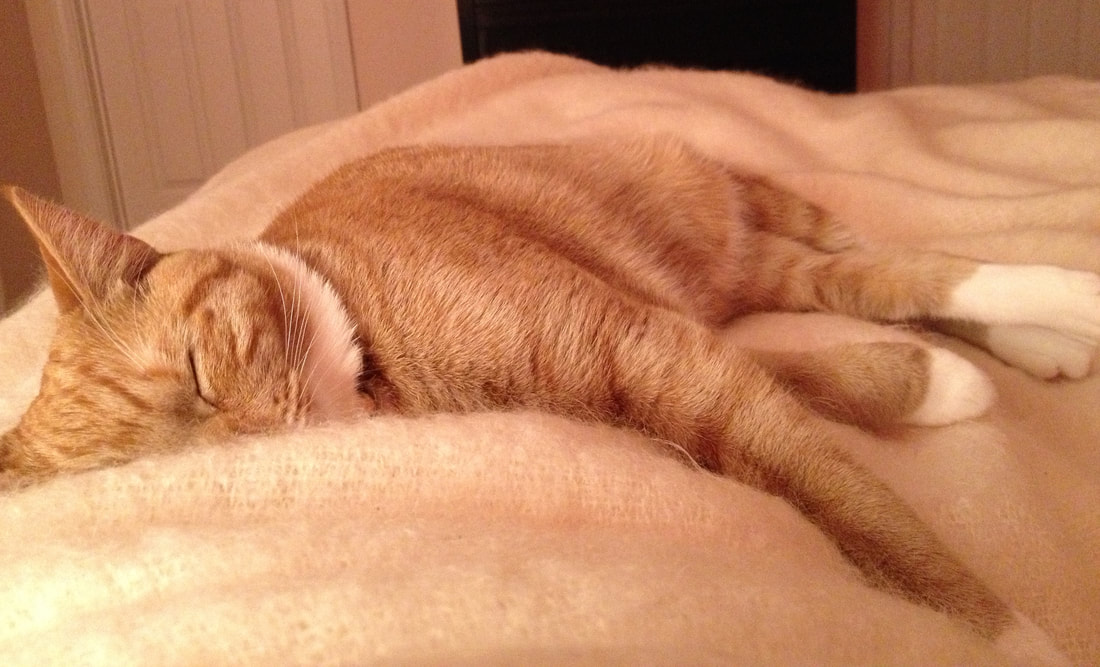|
I’ve been thinking about where we look for satisfaction, and why so many seem to live day after day without actually finding it. This has led me to some thoughts I’d like to share with you. All living beings require a certain level of support from their physical environment in order to keep living. Take away the essential elements of food, water, warmth and oxygen, and most cannot long survive. As advanced beings we of course have those same needs. However as humans we go further than simply basic physical needs. We have a need for a certain internal sustenance, sometimes called “psychological needs”, which animals do not seem to have. Once an animal’s physical needs are met most are content to sleep or play. No internal desire seems to drive them to achieve more, or better or different. If curling up on the couch or on the porch can be seen as evidence of happiness and satisfaction, then observably they are at peace.
But whereas your cat or your dog can find internal peace by having its physical needs satisfied, that is only the beginning for humans. In our society most people’s physical needs are met. Why then is there so much strife and dissatisfaction among us? It may be because our psychological needs are not being met. We do our best to meet them. We struggle for more recognition and prestige, more self-esteem, more confidence, more control, more material possessions, all designed to bring us more internal peace and happiness. While these are psychological needs, and not survival needs, nevertheless they are part of being human, and there is nothing inherently wrong with seeking to satisfy them. Here’s where it gets a little complicated, though. Think about this. As infants we quickly learn that we can satisfy our physical needs by manipulating our environment. A baby cries and is fed, or changed or held, and generally then finds contentment once its physical need is addressed. We grow into adulthood having seen firsthand how manipulating our external environment leads to having our needs met. But when it gets tricky is when we try to satisfy our psychological needs in the same way – by manipulating our environment. We adopt the point of view that if there is something I’m missing or some internal need I feel, that I can satisfy that internal need in the same way – by changing something in the environment. How many women have gotten married thinking that they will be able to change a decent man into a more perfect man and then really be happy with him? How many times has the ideal dream job turned into a disappointment because of some unforeseen external circumstance? A new car? A new house? A bigger TV? A new wardrobe? Nothing wrong with any of that, but if it is sought in order to fix an internal lack we soon discover that the lack outlasts the initial feeling of initial satisfaction, and we need yet another “fix”. The cycle begins again, and the internal need continues to never quite be met. So here’s the thing. Our internal needs, the psychological needs that humans alone seem to have, cannot be met by manipulating our environment. We’ve all heard somebody say, “if he’d just put the cap back on the toothpaste…”, or “why is my boss so unreasonable…", or “this traffic drives me nuts…” or “why won’t my daughter keep her room clean”… and on and on. We look outside ourselves for the thing to fix which will then make us alright inside, something to give us that internal feeling we seem to crave. It has been said that “a happier state of consciousness is the … fundamental criterion by which, consciously or unconsciously, we make our decisions.” Many times this is perceived as a need for more material possessions, more money or more something that we can use to give us that internal feeling we desire. "We perceive other people or external circumstance to be the root of our discomfort, and respond as we would to a physical lack – by making adjustments to the physical world. But this only deals with part of the problem. The inner lack continues, and soon reappears in some other guise. And so the apparent need continues. We are rather like Nasrudhin, the ‘wise fool’ of Sufi tales, who has lost his key somewhere in his house. But he is searching for it out in the street ‘because,’ he says, ‘there is more light outside.’ We too look for the key to fulfillment in the world around because that is the world we know best. We know how to change this world, how to gather possessions, how to make people and things behave the way we want – the way we think will bring us happiness. We know much less about our minds and how to find fulfillment within ourselves. There seems to be ‘much less light in there.’ " If we could gain internal happiness from external sources, then all our needs would be met. But that approach only works for satisfying our physical needs. However, because it does work that way and because we have seen it happen all our lives, it is quite natural to expect that it would work to satisfy our internal needs as well. But if you step back and just look it is plain to see that that simply is not true. So then how do we find that internal fulfillment? Not by looking outside ourselves, but rather by seeing the true nature of our current way of seeking it, and then to no longer rely on the external change method. You don’t have to renounce material possessions and go live in an ashram or take up chanting all day, although those have worked for some. Rather you must begin to look for the “key” where it actually is. That is what Elle Unleashed is all about. Together we can find that key and use it to unlock your bound-up happiness. It’s not even difficult. I invite you to connect with us. PS - Quotes from “The White Hole in Time” by Peter Russell.
0 Comments
Leave a Reply. |
AboutFrançoise Everett, MS is a facilitator, feminine leadership coach, author, speaker and lifestyle business owner. She works and supports women entrepreneurs and women who hold leadership positions by unlocking their inner wisdom, feminine power, and hidden richness. Archives
June 2024
Categories
All
|
Continued use of this site indicates that you accept this policy. Read more.



 RSS Feed
RSS Feed
